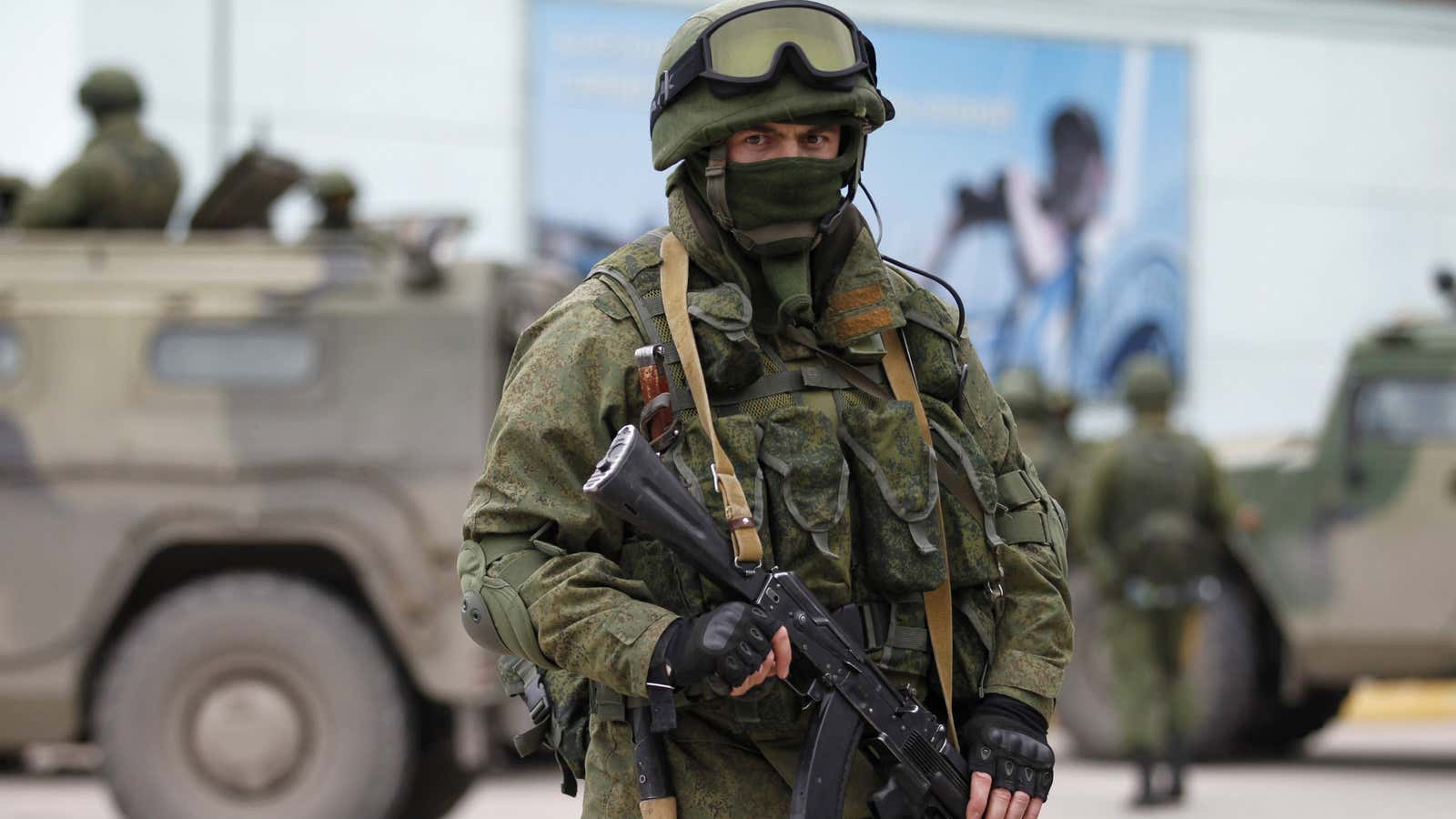In the 1990s, Russian troops overthrew a disfavored government in Tajikistan and stirred the Caucasus by arming both sides of the conflict between Armenia and Azerbaijan. Upset with the incumbent Georgian government, they bolstered separatists who brought the country to the brink of collapse. But those were days of a weak, post-Soviet Russia, and the actions of a few special forces and intelligence dead-enders. It was only a decade later, amid rising oil prices, when Moscow could begin to more effectively assert its will at home and abroad.
After a roughly 48-hour operation of deception in the Ukrainian peninsula of Crimea, Russian president Vladimir Putin today communicated openly what that means: The territory of former Soviet nations is Russia’s dominion when it so chooses.
Moscow’s current target is Ukraine, which Putin sought and received permission to invade after Russian troops had already taken Crimea. Using the hard language of an occupation army, Putin is seeking to reverse last week’s ouster of Ukraine president Viktor Yanukovych and restore the country’s alliance with Moscow.
As they will in cases of big winners and losers, observers are taking potshots. Some call Putin’s lightning strike a Western diplomatic disaster, yet more evidence of their foreign policy weakness. If only US president Barack Obama had been tougher and braver in Syria, they say, Putin would have thought twice. The Russian leader would have taken Obama’s redline on Ukraine seriously.
They are wrong, at least for now: Putin himself lost Ukraine a week ago when the Kiev street threw out Yanukovych. That was a genuine disaster for him and Russia, for whom Ukraine holds existential value. But no amount of Western tough-guy-ism—nor different actions in Syria or elsewhere—would have deterred Putin from responding to the Ukraine uprising as he saw fit. When observers suggest otherwise, they contradict their own description of Putin as rogue actor.
Yet it is true that Putin wrong-footed the bulk of the experts and specialists. Those who forecast no invasion are facing acid remonstration, such as this from an unidentified former US intelligence officer in the Daily Beast: “Putin throws banana peels on the ground, and Obama manages to slip on every one of them. I’ve never seen anything like it.” Given Russia’s history and Putin’s character, it was all so predictable.
I am among those surprised by Putin. I was based in the former Soviet Union for 11 years as a correspondent, and have watched it from abroad since then. I tweeted this the day after Yanukovych’s ouster:
I was referring to 2008, when Putin sent troops pouring over the Georgian border in what he called a response to aggression against South Ossetians. In the aftermath, Georgia lost not just South Ossetia to Russian control but its seaboard strip of Abkhazia, just south of Sochi. I meant that Ukraine would not stand by idly as Georgia did while its territory was carved away by a foreign army.
I and others assumed wrongly that Putin, as a rational actor, would not take that gamble. Instead he reverted to stereotype. “All you really need to do to seem clairvoyant about [Russia] is to be an utter pessimist,” writes Julia Ioffe.
Time will tell how the Ukraine street responds to Putin. He is banking on a Georgian answer, that shock and awe will dissuade Ukrainians—their forces no match for Russia’s—from engaging in a drawn-out conflict such as Moscow faced in Chechnya, or any conflict at all.
In this sense, Putin’s brinksmanship is short-sighted. He has already squandered the good feelings earned at the Sochi Olympics. If Kiev keeps to its independent course, he will possess another spit of territory in a foreign land, perhaps with added strips of eastern Ukraine, as well, if his men keep marching. But he will lose the heartland of Kiev to the West, and perhaps end up in a bloody new guerrilla conflict.
As for diplomacy, some say the US and the West have few options in the way of response. That is also not true. NATO will not—nor should it—go to war. But, as Eugene Romer and Andrew Weiss write at Politico, Russia’s honorary membership in the G-8 is probably now history: The western-led leadership group will be back to the G-7. Putin will have to suffice with his alliance of rogues and spoilers—China, Syria, and Iran. Many more of his senior aides could end up on a no-fly visa list to the West.
Given the choice, Putin would opt for delivering a bloody nose and against international influence almost every time. But that axiom understands his actions too simply. What he actually craves is to deliver the bloody nose and hang out with the global establishment, even as he sneers at it. In this sense, Ukraine–for Putin–may be a distinctly costly blow.




